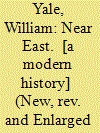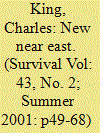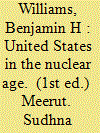|
|
|
Sort Order |
|
|
|
Items / Page
|
|
|
|
|
|
|
| Srl | Item |
| 1 |
ID:
148650


|
|
|
|
|
| Summary/Abstract |
This essay draws on archival documents to explore the British Empire’s plans for establishing a university in the eastern Mediterranean in the 1930s. The British possessions in the region were at stake in the aftermath of the First World War. Since the early 1930s the Foreign Office had been eagerly planning the establishment of a university in the region in order to make the local elites familiar with Western culture. Egypt, Palestine, and Cyprus were considered the most likely locations for the institution. It is argued that cultural propaganda was perceived by the Foreign Office as an essential component of the empire’s strategy and legitimacy in its sphere of influence. Although the project was eventually not realized due to the outbreak of the Second World War, its significance lies in the demonstration of the British grand strategy in the eastern Mediterranean during the interwar period.
|
|
|
|
|
|
|
|
|
|
|
|
|
|
|
|
| 2 |
ID:
073686


|
|
|
|
|
| Publication |
2006.
|
| Summary/Abstract |
Why do great powers expand? Offensive realist John Mearsheimer claims that states wage an eternal struggle for power, and that those strong enough to seek regional hegemony nearly always do. Mearsheimer's evidence, however, displays a selection bias. Examining four crises between 1814 and 1840, I show that the balance of power restrained Russia, Prussia and France. Yet all three also exercised self-restraint; Russia, in particular, passed up chances to bid for hegemony in 1815 and to topple Ottoman Turkey in 1829. Defensive realism gives a better account of the Concert of Europe, because it combines structural realism with non-realist theories of state preferences.
|
|
|
|
|
|
|
|
|
|
|
|
|
|
|
|
| 3 |
ID:
026913


|
|
|
|
|
| Edition |
1st ed.
|
| Publication |
New Delhi, Oriental Books Repring Corporation, 1981.
|
| Description |
xi, 411p.: ill., mapshbk
|
| Contents |
Vol. I
|
|
|
|
|
|
|
|
|
|
|
|
Copies: C:1/I:0,R:0,Q:0
Circulation
| Accession# | Call# | Current Location | Status | Policy | Location |
| 020529 | 958.1/SYK 020529 | Main | On Shelf | General | |
|
|
|
|
| 4 |
ID:
141840


|
|
|
|
|
| Edition |
New, rev. and Enlarged ed.
|
| Publication |
Ann Arbor, University of Michigan press, 1968.
|
| Description |
x+ xxii , 489p.: mapshbk
|
|
|
|
|
|
|
|
|
|
|
|
Copies: C:1/I:0,R:0,Q:0
Circulation
| Accession# | Call# | Current Location | Status | Policy | Location |
| 001831 | 956/YAL 001831 | Main | On Shelf | General | |
|
|
|
|
| 5 |
ID:
019450


|
|
|
|
|
| Publication |
2001.
|
| Description |
p49-68
|
|
|
|
|
|
|
|
|
|
|
|
|
|
|
|
| 6 |
ID:
115353


|
|
|
|
|
| Publication |
2012.
|
| Summary/Abstract |
The term 'anti-Semitism' indicates how far the anti-Jewish literature of the late nineteenth and early twentieth centuries was charged with themes, figures, and stereotypes from contemporary discourses on the Orient. An increasing tendency to 'orientalise' the European Jews had raised questions about the supposed origin of the Jewish people in the Near East and its relationship to other - current or historical - peoples. Focusing on the Nazi racial scientist Ludwig Ferdinand Clauß, the article draws attention to the impact of Near Eastern anthropology, ethnology, and archaeology in the Age of Empire on modern anti-Semitism and sheds light on structural convergences and differences between colonial or 'Orientalist' discourses and anti-Semitism in general. With reference to the scholarly literature of the time, Clauß made a sharp distinction between 'Oriental' or 'Semitic' Arabs and 'Near Eastern' Jews. Thereby, the romanticised Arab Orient served as an antipole to a 'Nordic' Europe, and as such was finally able to advance to a positive alternative. The Jewish Orient, on the other hand, embodied a threatening ambivalence and contrariety, which from the very beginning precluded romanticisation and identification.
|
|
|
|
|
|
|
|
|
|
|
|
|
|
|
|
| 7 |
ID:
029532


|
|
|
|
|
| Publication |
London, Prank Cass, 1973.
|
| Description |
ix, 261p.hbk
|
| Standard Number |
0714629847
|
|
|
|
|
|
|
|
|
|
|
|
Copies: C:1/I:0,R:0,Q:0
Circulation
| Accession# | Call# | Current Location | Status | Policy | Location |
| 013237 | 956/HOL 013237 | Main | On Shelf | General | |
|
|
|
|
| 8 |
ID:
030752


|
|
|
|
|
| Edition |
1st ed.
|
| Publication |
Meerut, Sudhna Prakashan, 19??.
|
| Description |
253p.hbk
|
|
|
|
|
|
|
|
|
|
|
|
Copies: C:1/I:0,R:0,Q:0
Circulation
| Accession# | Call# | Current Location | Status | Policy | Location |
| 004411 | 973/WIL 004411 | Main | On Shelf | General | |
|
|
|
|
|
|
|
|
|